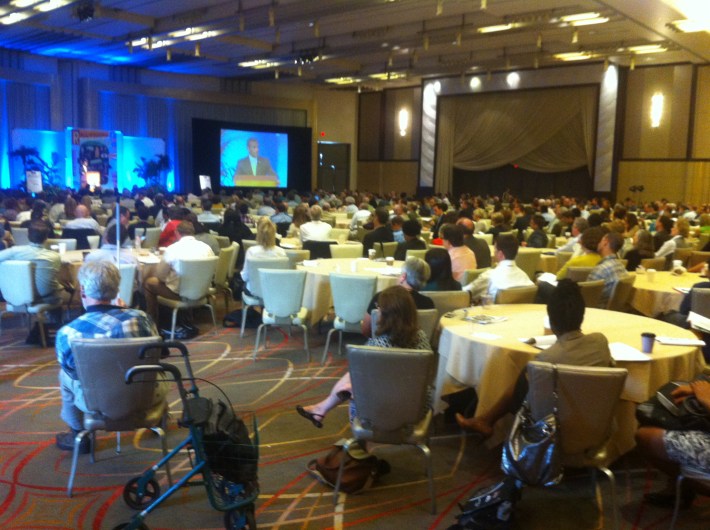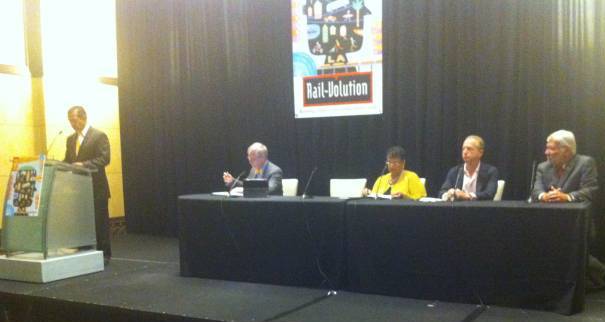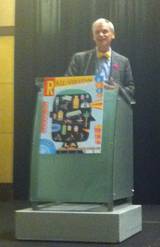
Just over a month ago, planners, advocates and political leaders from around the country descended on Long Beach for the annual "Pro Walk/Pro Bike Conference" to plan the next steps in the Livable Streets movement. This week, Los Angeles takes its turn on center stage as host of Railvolution, and Mayor Antonio Villaraigosa was there to roll out the red carpet.
The tagline for this year's Railvolution is "Building Livable Communities with Transit." By holding the conference at the Loews Hollywood Hotel, across the street from the Hollywood/Highland Red Line subway stop, Los Angeles is able to showcase both the good and the bad of its Transit-Oriented Development (TOD) planning. On one hand, the stop allows for people to access many of Hollywood's attractions and for tourists to access the rest of the city. On the other hand, the lack of advance planning before the subway was built led to expensive TOD developments that don't always blend smoothly with the community.
Following short introductory pieces by Metro's CEO Art Leahy and Board Chair Mike Antonovich, the mayor took the stage.
"Welcome to Railvolution," he began, before launching into a laundry list of transit expansion projects and a call to support Measure J, the Los Angeles County sales tax extension on the fall ballot that would allow Metro to, in the mayor's words, "build three decades of mass transit projects in one [decade]."
While Villaraigosa sounded upbeat about the ballot measure's passage, and polls show it would pass narrowly, if a vote were held today, he also noted that there is significant opposition to overcome.
"The same familiar chorus is sniping and complaining," he claimed before launching his applause line, "Of course, the same people are the first in line to spend the money."
He did not mention that one of those "sniping and complaining" is Antonovich, who authored the statement against the ballot proposition that is mailed to voters ahead of the election.
But the mayor stuck to the positives, and outlined a vision of a future Los Angeles filled with transportation options. Gone are the days when Los Angeles "invented sprawl" or "built a freeway system that is second to none" or even "built a transit system without planning what to build around it."
This is a new Los Angeles, he claimed. One that spent $1.5 billion in recent years in transit expansion and is planning for 1,600 miles of new bikeways.
The parts of the speech on bikeways earned laughter and some of the biggest applause.
"It used to be we had to do an EIR to do a bikeway," Villaraigosa began. "I went to the legislature and said, 'Are you kidding me?'"
The room burst into laughter. The mayor went on to note that bike advocates couldn't find a Democrat willing to change the state's landmark environmental laws, but they could find a Republican. Legislation streamlining the environmental process for bike lanes that don't require a loss of through-travel lanes was signed into law last month.
Of course, it's not just a handful of elites that want to see L.A. change. Villaraigosa pointed to recent events to show the latent demand for more transportation options.
"Upwards of 200,000 people took to the streets for CicLAvia," Villaraigosa stated, "We saw it again during Carmageddon."
Following the introduction, press were invited to meet with Villaraigosa, Congressman Earl Blumenauer (D-OR), Los Angeles Businessman David Bohnett, and Manager of Metro Atlanta Regional Transit, Dr. Beverly Scott.

At the press event, Villaraigosa aggressively pushed the idea of a changing Los Angeles, and both Blumenauer and Scott discussed the city's role in helping change the national conversation.
Blumenauer, who looked a bit like a college professor with his bow tie and pink bicycle lapel pin next to the polished Villaraigosa, gave Los Angeles a plug as a new national leader in transit and livable communities.
"There's no place in America that better exemplifies everything we're trying to do than here in Los Angeles," the Congressman began. "Local examples (in investment) such as this will help get the federal government back on track."
While America's mid-sized cities such as Minneapolis, Long Beach, and Blumenauer's home city of Portland may be leading the way, when a New York or a Los Angeles take a leadership role, the world takes notice.
"The changes you see taking place around L.A. are an example of the transformative nature of transportation," closed Blumenauer.
When he spoke of changes, he wasn't just talking about the increased investment in transit and bicycling, but also the side effects of thinking of streets as something more than a place to move cars, such as CicLAvia, the city's pocket parks program or aggressive campaigns to get crowds to major events without an over-reliance on freeways and the automobile.






